November 30, 2021
Latino students succeed in graduate school with the support of the Hispanic Theological Initiative
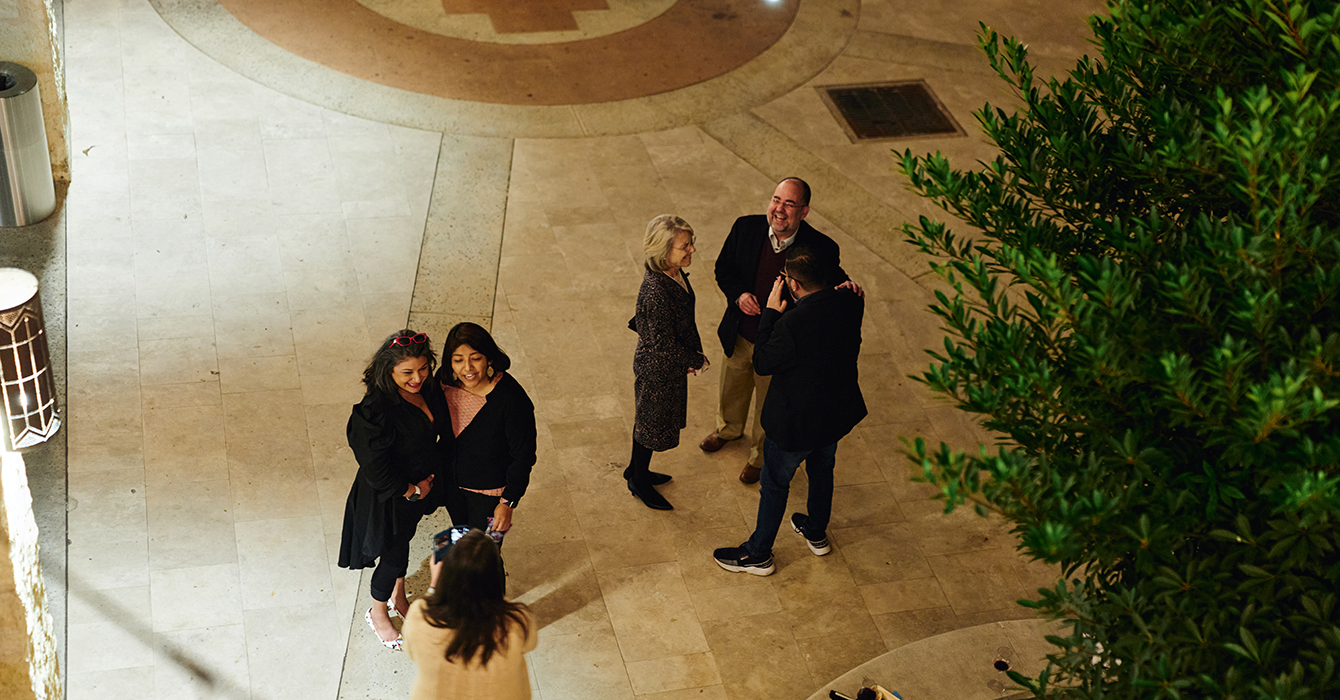
Melissa Pagán and Kenia Vanessa Rodriguez have their picture taken while Keo Cavaltanti and his wife, Beth, chat with a friend. Friends and colleagues met Nov. 19 at the Hispanic Theological Initiative's 25th anniversary celebration at the San Fernando Cathedral Center in San Antonio, Texas. The celebration was hybrid and included gatherings in other cities as well. Photos by Vincent Gonzalez
HTI’s emphasis on mentoring, editorial support and community has created a network that participants refer to as la familia.
The Rev. Dr. Loida I. Martell recalls a critical, do-or-die moment she faced while pursuing a Ph.D. in theology from Fordham University.
Martell’s graduate adviser had repeatedly rejected her dissertation research proposal. The delay threatened to torpedo a fellowship Martell had been awarded by the Hispanic Theological Initiative (HTI) to complete her thesis.
“He kept putting up obstacles,” Martell said of her adviser. She was frustrated and dismayed that her plans to become a college professor teaching theology were foundering.
That’s when Martell learned that HTI did more than award financial aid to Hispanic graduate students. Scholars at HTI championed her research proposal, lobbying Fordham officials until they reviewed her proposal again.
It was approved.
Martell earned her Ph.D. in 2005 and today is vice president for academic affairs and dean at Lexington Theological Seminary in Lexington, Kentucky. Martell, who is an ordained Baptist minister as well as a veterinarian, pioneered the study of evangelica theology.
“Had it not been for HTI, I am not sure I could have completed the program,” Martell said. “Here I am today, a full professor and dean.”
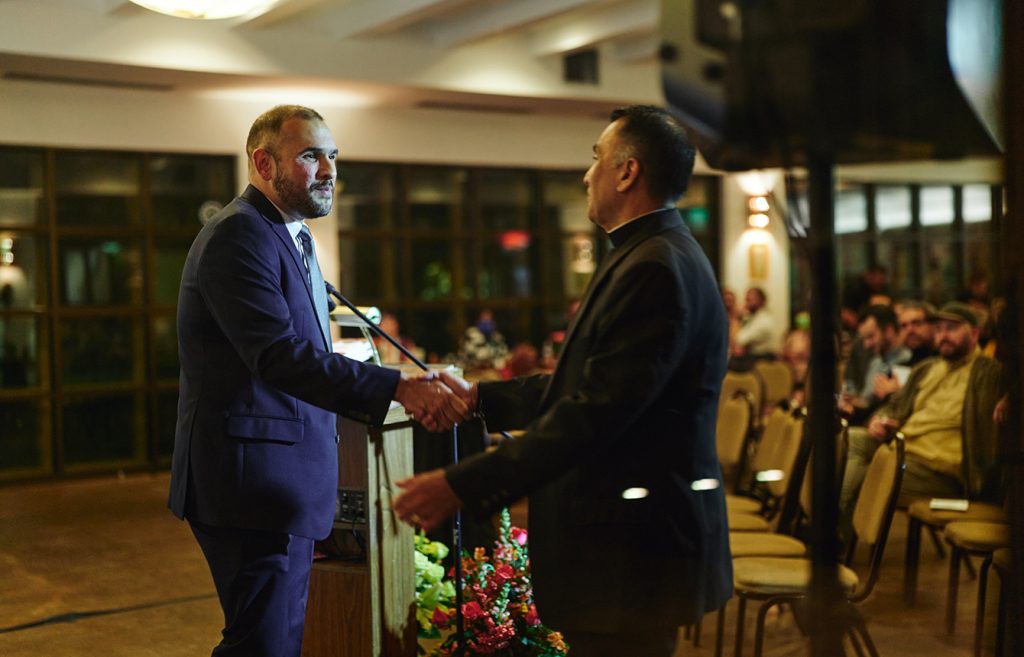
João Chaves, HTI assistant director for programming, welcomes the Very Rev. Carlos Velázquez, of San Fernando Cathedral, to the podium. The gathering included a social hour and a short program.
Succeeding en conjunto
By all accounts, earning a U.S. doctoral degree can be arduous, time consuming and financially draining. In some fields, Ph.D. completion rates can be less than 50%, according to the Council on Graduate Education.
Yet HTI — which celebrates its 25th anniversary this year — has been expanding the ranks of Latinos with Ph.D.’s in religion and theology. The initiative boasts a 93% completion rate, with students finishing in an average of 5.5 years. In October, its collaborative consortium, comprising 24 theological higher education institutions, celebrated its 150th graduate.
Lilly Endowment Inc., in its 2020 annual report, noted the importance of expanding the number of Latino theological faculty — whose representation in American theological schools is currently less than 5%.
Yet as early as 2012, The Association of Theological Schools reported that students of color made up more than a third of total enrollment in ATS theological schools, an increase of 55% over a 20-year period.
With that growth and “with the racial/ethnic composition of the general US population projected to grow to majority status by 2040, this trend warrants thoughtful response to ensure that schools — and their graduates — have the capacity to serve an increasingly multiracial and multicultural world,” the ATS report said.
David Nirenberg, the dean of the University of Chicago Divinity School, said in a social media anniversary video that HTI is addressing this gap by supporting new, young scholars in a variety of ways.
“HTI has thought about … how to provide students not only with the finances, not only with the editorial help, the holistic help, [but] also with the networks, with the spiritual and familial,” Nirenberg said. “That’s why so many HTI students talk about la familia.”
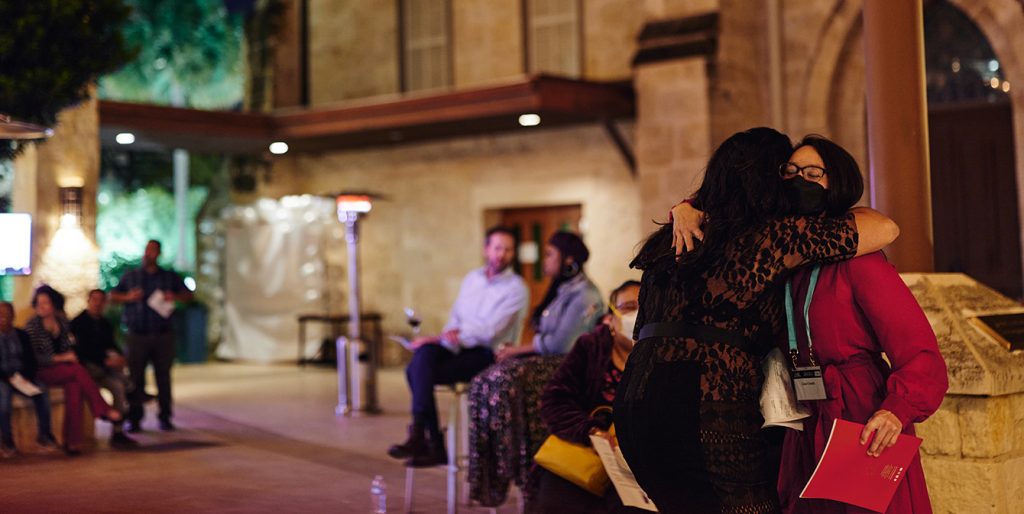
Friends greet each other at the event, which was held before the annual meetings of the American Academy of Religion and the Society of Biblical Literature.
The initiative surrounds and supports students from the beginning of their graduate education through their early careers. HTI’s offerings now include scholarships, mentoring, editorial assistance, a professional development conference and funds for networking. After graduates are hired, they also receive support as they begin their first positions. And a new program supports women who aspire to leadership.
What memories of a valued mentor (formal or informal) were sparked for you when reading about Ph.D. student Victoria Pérez Rivera and her mentor, Sophia Magallanes? Could you serve as a mentor to someone in your context?
HTI also has established a public theology blog, a peer-reviewed bilingual journal, a book prize, a collection of dissertations (among them Martell’s dissertation, “Liberating News: An Emerging U.S. Hispanic/Latina Soteriology of the Crossroads”) and other resources.
HTI alumni now can be found at all levels of theological higher education, across all denominations and beyond the members of the consortium, said Joanne Rodríguez, HTI’s executive director.
“We have scholars that are now presidents of academic institutions, deans, tenured faculty, full professors,” she said.
HTI counts on those same alumni to execute the part of the program described by nearly everyone as the heart of the effort: mentoring.
Senior scholars help students navigate doctoral programs, including collaborating with the students’ doctoral advisers and advocating in their behalf when necessary.
Students enrolling in the first, second or third year (the comprehensive exam year) of study are paired with mentors for up to three years, and many have developed strong personal and professional bonds.
In a recent HTI podcast, Ph.D. student Victoria Pérez Rivera thanked her mentor, Fuller Seminary adjunct professor Sophia A. Magallanes.
“For the first time ever, I saw myself; I saw what I could potentially become one day,” Rivera said. “Your mentorship of so many of us has played a pivotal role in a lot of our lives, especially mine.”
HTI leaders say the organization takes mentoring to a new level by creating a community of scholars who work together — an approach they call en conjunto — to ensure the success of each graduate.
Theology in the Latino community is done in a collaborative spirit, Martell said. “No one is unimportant; no one is silenced; no one is ignored.”
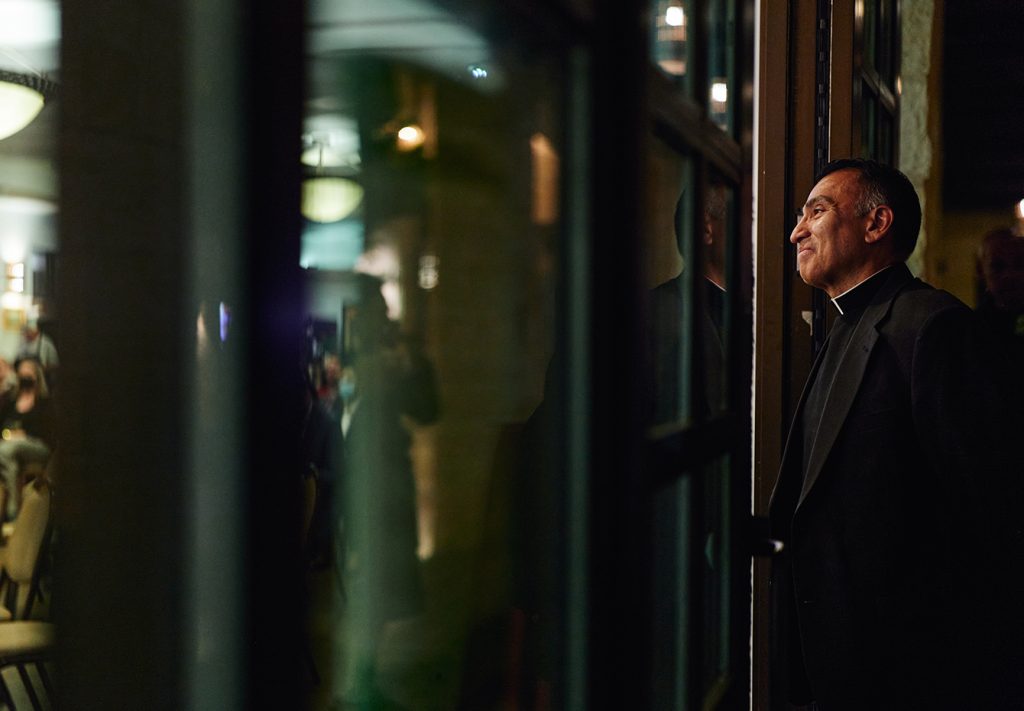
The Very Rev. Carlos Velázquez waits to be introduced.
Creating a new pipeline
The first HTI fellowships were awarded in 1996. A year earlier, HTI had been launched at Emory University by a group of dedicated Latino theology scholars.
Ana Maria Pineda, a theologian at Santa Clara University, was one of those early pioneers. The group, she said, was motived to do something because of the lack of Latino theologians.
What strikes you about the founders’ ecumenical vison and mission to serve the church with prepared and confident Latino/a theologians and religious educators? Why is this mission important for the church today?
“The pipeline was small back then,” said Pineda, who co-chaired a committee with renowned church historian Justo González — author of the 1988 landmark study “The Theological Education of Hispanics.”
It was one of the first publications to identify the need for more Latino faculty in institutions engaged in theological education, along with more interaction in those institutions among Latino peers, theologians, teachers and scholars.
Pineda’s committee met several times, in Chicago and again in Puerto Rico, she said, to lay out the vision for HTI. She stressed that committee members wanted to make sure the efforts remained ecumenical.
They prepared a report — “The National Survey of Hispanic/Latino Theological Education” — and submitted it to the Pew Charitable Trusts, which agreed to provide a major startup grant.
Efrain Agosto served on HTI’s first committee selecting fellows and then in 1999 became HTI’s third postdoctoral fellow.
With no mentors or other Latinos for collaborative support, Agosto said, it took him a decade — from 1985 to 1996 — to earn his Ph.D. in New Testament Studies from Boston University.
“It was detrimental to my completing the program to go at it essentially alone,” said Agosto, who now is the Croghan Bicentennial Professor in Biblical and Early Christian Studies at Williams College.
Since then, Agosto has collaborated on projects with other HTI graduates, including editing a collected volume in 2018.
“Because HTI has done a wonderful job at fostering a collaborative community for people to work en conjunto, it made it easier when it came to crafting a book like this,” Agosto said in a 2019 interview in Journeys, HTI’s newsletter.
“It was easy to bring people together to work fruitfully, because we had a network and a common set of practices.”
Martell agreed.
“What so many of us experience in our institutions — the need to fight tooth and nail to be heard and respected — we find that when we come to HTI, we don’t need to fight any longer,” she said. “We are in a place where we ‘fit’ and where subsequently we function.
“But more than function, where we thrive and thus become gifts to each other and to the community at large.”
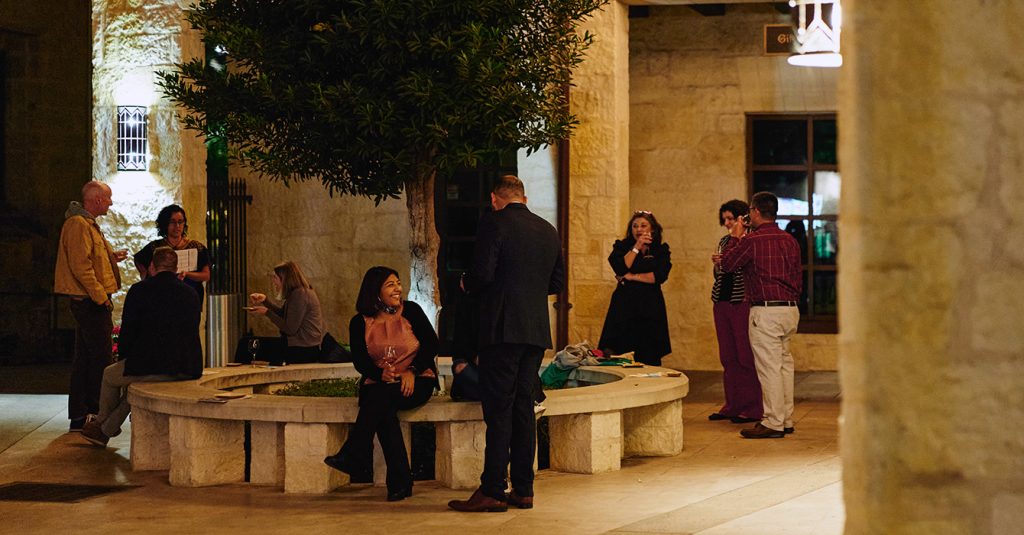
João Chaves, who is an HTI graduate as well as a staffer, chats with Kenia Vanessa Rodriguez (seated).
The consortium
Over the years, HTI’s business model has been revised as the organization sought better financial footing.
In 1999, HTI moved its headquarters to Princeton Theological Seminary, and the seminary provided basic operational funding. Rodríguez opened the office as assistant director, then became executive director in 2002.
How has the shared leadership model of HTI contributed to the ongoing innovation described in this story?
The consortium was launched in 2007; there now are 24 member schools.
In 2016, Princeton offered $100,000 in annual support, and the membership fee from each school was set at $6,500 for the first student and $3,500 for each additional student. To cover the full cost of about $8,500 per student, the staff began aggressive fundraising and received grants from Lilly Endowment Inc., the Henry Luce Foundation, the W.K. Kellogg Foundation and Trinity Church Wall Street.
“We began experiencing growth after 2016, when we introduced dissertation fellowships, Lilly funded,” Rodríguez said. At that time, there were about 41 students; last year, HTI reached its highest enrollment at 64.
“HTI has proven itself,” said Edgardo A. Colón-Emeric, who is dean of Duke Divinity School.

Duke Divinity School Dean Edgardo A. Colón-Emeric visits with Old Testament professor Pablo Andiñach as a band plays in the courtyard.
In video feeds on Facebook and Twitter commemorating HTI’s 25th anniversary, leaders of the consortium institutions praised the organization for its approach, completion rate and high-quality graduates.
Could you learn from the en conjunto approach, even if your context is not Latino?
“The number of HTI scholars who have been successful in getting teaching positions has been so remarkable,” said Kah-Jin Jeffrey Kuan, the president of Claremont School of Theology. He noted that in the past decade, seven HTI scholars from Claremont have found jobs in the field.
Nirenberg, from the University of Chicago, said others in higher education who are truly interested in diversity, equity and inclusion should consider replicating the HTI approach.
“This is a model which every institution that takes diversity seriously should implement at every level,” he said. “This is what it takes — en conjunto — this is what it takes to succeed in what we all say we want to succeed at.”
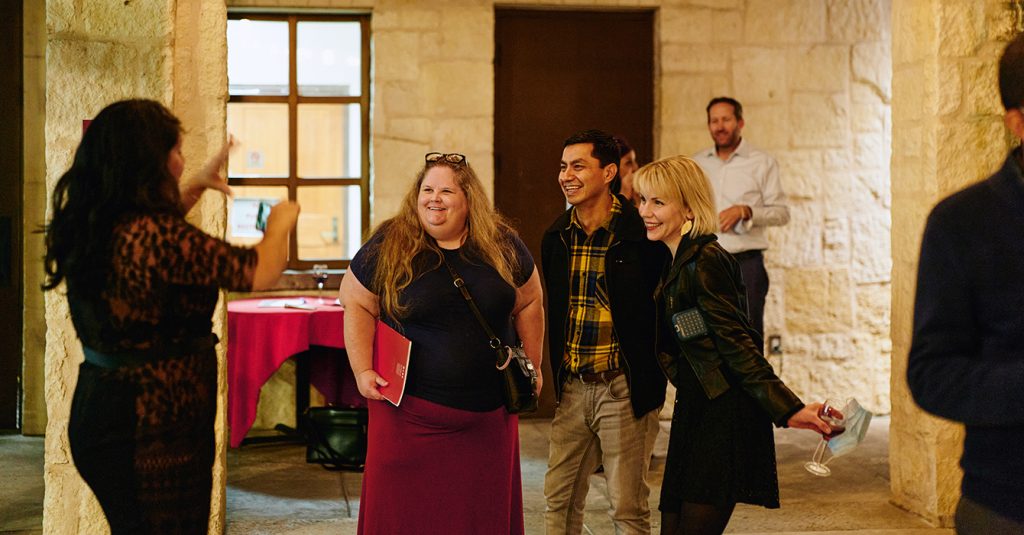
Erica Ramirez takes a picture of Andrea Johnson, Sammy Alfaro and Leah Payne.
The next 25 years
Frank Yamada, the executive director of The Association of Theological Schools, said HTI has created a “safe space” for Latino graduate students to receive feedback without being misunderstood.
HTI has begun expanding this safe space — and its scope.
In 2019, the organization launched Open Plaza, an online forum with a blog, a podcast and conversational talks.
“HTI has always been much more than about graduating a student; we want them to thrive and contribute to the larger landscape of theological and religious education,” Rodríguez said.
The Lilly grant helped launch an internship program for pre-dissertation students and Early Career Orientation (ECO), which provides mentors to help early-career HTI graduates navigate their first teaching jobs.
José Francisco Morales Torres, an assistant professor of Latinx studies and religion at Chicago Theological Seminary, is part of the new program.
HTI found ways to involve institutions in sharing ownership for the success of the Latino/a scholars’ formation and career launch. What features of HTI’s consortium model could be valuable for your ministry context?
“I am now living in my call to teach with boldness and courage, thanks to HTI and its ECO,” he wrote in a testimonial online. “I am eternally grateful.”
Tito Madrazo, program director in the religion division at Lilly Endowment Inc., is a more recent graduate and HTI participant. He joined HTI in 2013 after Colón-Emeric, his professor at Duke Divinity School, introduced him to the organization.
“Being part of the community was an incredible gift,” said Madrazo, who graduated in 2018 with a Th.D. in homiletics. “It helped shape my research and introduced me to wise mentors as well as fellow doctoral students who were on similar journeys.”
One of those mentors was Martell, who “remains a close friend,” Madrazo said. “As a pastor and a scholar, she shares my commitments to both the church and the academy. Loida helped me to see the broader history and panorama of Hispanic/Latinx homiletics.”
HTI hopes to soon have more Latinas like Martell thanks to the Lilly grant. Lilly also is funding Latinas in Leadership, an invitation-only program to help women prepare for senior positions.
Martell is excited about the Latina effort, because she estimates that the number of Latinas in full-time teaching positions in ATS member schools is less than 40.
“Yet thanks to HTI, we are making headway,” Martell said.
Questions to consider
- What memories of a valued mentor (formal or informal) were sparked for you when reading about Ph.D. student Victoria Pérez Rivera and her mentor, Sophia Magallanes? Could you serve as a mentor to someone in your context?
- What strikes you about the founders’ ecumenical vison and mission to serve the church with prepared and confident Latino/a theologians and religious educators? Why is this mission important for the church today?
- How has the shared leadership model of HTI contributed to the ongoing innovation described in this story?
- Could you learn from the en conjunto approach, even if your context is not Latino?
- HTI found ways to involve institutions in sharing ownership for the success of the Latino/a scholars’ formation and career launch. What features of HTI’s consortium model could be valuable for your ministry context?
